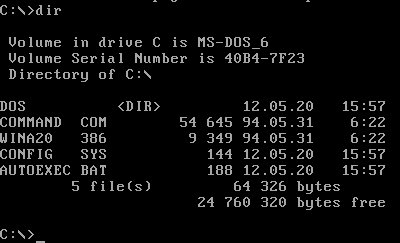
Microsoft has announced the release of the sources of versions 1.25 and 2.0 of its MS-DOS operating system, which were made available on the GitHub website, under the MIT free / open source license. In 2014 the same sources were released to the Computer History Museum but with a restrictive license, for historical reasons. The released versions are very old and Microsoft will not accept pull requests to modify them sent through the GitHub system but anyone can freely not only read the assembly code but also experiment with it, perhaps on a virtual machine.
MS-DOS is the operating system that was picked by IBM for its personal computers, launched on the market on August 12, 1981. Microsoft purchased 86-DOS, which was basically a clone of the CP/M operating system, from Seattle Computer Products, adapted it to the 8088/8086 processors picked by IBM, added something to it and licensed it to IBM, which offered it as PC DOS 1.0.
The success of IBM PCs led to a broadening of the market with various producers that started offering clones that were then referred to as IBM-compatible that used MS-DOS as their operating system. This led to the creation of an ecosystem in which users could use MS-DOS software and exchange files, cutting off some other incompatible computers leaving Apple, some home computers and very few other competitors. Soon the first accusations against Microsoft of monopolistic practices also began.
Over the years, Microsoft kept on developing MS-DOS and other companies created operating systems compatible with it and FreeDOS still exists, provided in some cases with PCs on which the user doesn’t want Windows. Version 1.25 of MS-DOS is dated May 9, 1983 and consists of 7 source files, version 2.0 is dated August 3, 1983, is much more sophisticated and is made up of over 100 source files.
Later versions of MS-DOS up to 6.x in the early 1990s became increasingly sophisticated but to see features such as the support of partitions bigger than 32 MB – yes, MBytes – or 3.5″ floppy disks Microsoft should release them as well. Parts of this operating system that remained in Windows versions, though less and less important, so Microsoft may not want to reveal all its code.
Versions of MS-DOS from 1983 are not really useful from a practical point of view and the release of their sources under a free license still has above all a sense for historical reasons. The archive will remain static but you can fork it to create your own versions of the operating system. If you like to tinker with old 8086 assembly code, you might be interested in doing some experiment.


Permalink